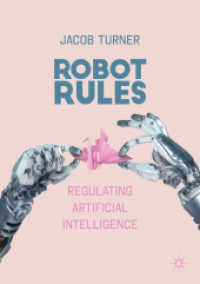Full Description
Winner, 2025 Hazel Gaudet-Erskine Best Book Award, International Journal of Press/Politics
Winner, 2024 Choice Outstanding Academic Title
A small but growing number of people in many countries consistently avoid the news. They feel they do not have time for it, believe it is not worth the effort, find it irrelevant or emotionally draining, or do not trust the media, among other reasons. Why and how do people circumvent news? Which groups are more and less reluctant to follow the news? In what ways is news avoidance a problem—for individuals, for the news industry, for society—and how can it be addressed?
This groundbreaking book explains why and how so many people consume little or no news despite unprecedented abundance and ease of access. Drawing on interviews in Spain, the United Kingdom, and the United States as well as extensive survey data, Avoiding the News examines how people who tune out traditional media get information and explores their "folk theories" about how news organizations work. The authors argue that news avoidance is about not only content but also identity, ideologies, and infrastructures: who people are, what they believe, and how news does or does not fit into their everyday lives. Because news avoidance is most common among disadvantaged groups, it threatens to exacerbate existing inequalities by tilting mainstream journalism even further toward privileged audiences. Ultimately, this book shows, persuading news-averse audiences of the value of journalism is not simply a matter of adjusting coverage but requires a deeper, more empathetic understanding of people's relationships with news across social, political, and technological boundaries.
Contents
Acknowledgments
1. Is Ignorance Bliss?
2. Who Are Consistent News Avoiders?
3. Why News Avoiders Say They Don't Use News
4. Identities: How Our Relationships to Communities Shape News Avoidance
5. Ideologies: How Beliefs About Politics Shape News Avoidance
6. Infrastructures: How Media Platforms and Pathways Shape News Avoidance
7. News for All the People?
Appendix A: Studying News Avoidance Using Interpretive Methods
Appendix B: Summary Tables Describing Study Participants
Appendix C: Interview Protocols for In-Depth Interviewing
Notes
Index








